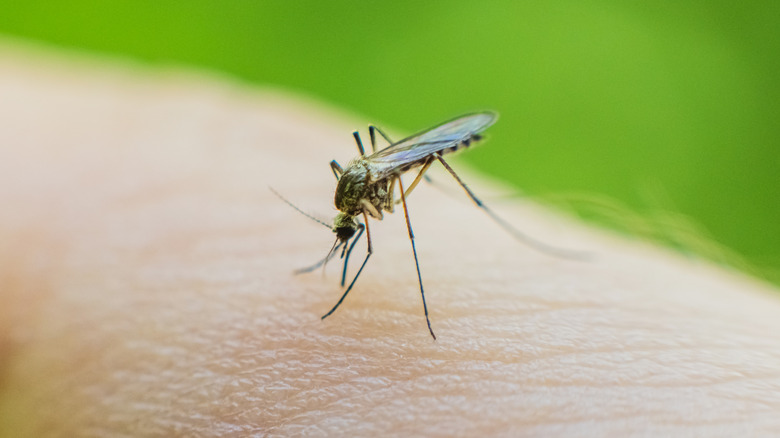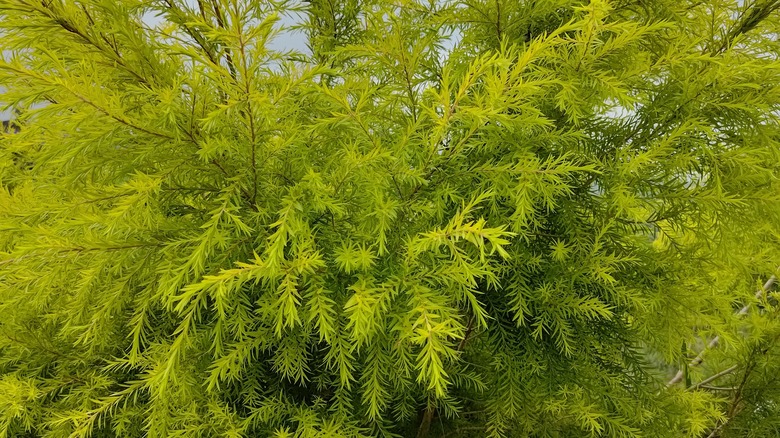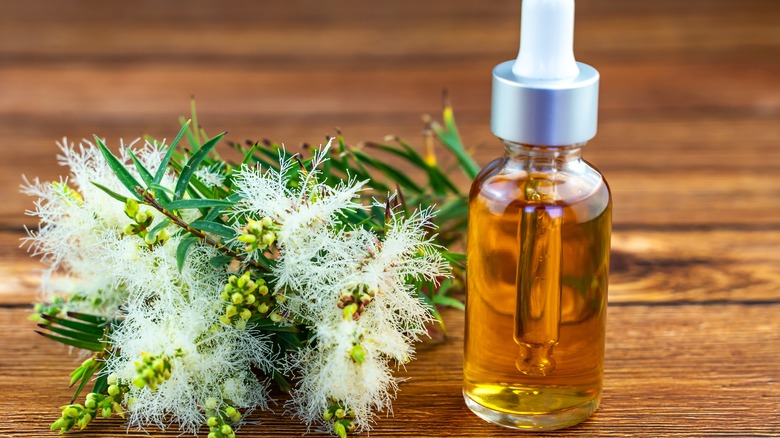Keep Clippings From This Stunning Outdoor Plant In Your Home To Deter Mosquitoes
Displaying attractive cut foliage in your home can be just as pleasing as bringing in gorgeous flowers that you've grown in your garden, but what sets foliage plants apart from flowers is their ability to last in a vase for much longer than many blooms will. Some cut foliage plants will even dry naturally and provide you with an attractive display as the leaves dry. One such plant is Melaleuca bracteata, commonly known as river tea tree, black tea tree, or golden bottle brush. The tea tree family of plants is also known for their insect repelling properties and are one of the best chigger-repelling plants to add to your yard.
While there's no specific scientific data that supports the idea that bringing cut branches of this delightful tea tree indoors will actually deter mosquitoes, House Digest spoke exclusively to a couple of Australian native plant experts to get their take on whether this might work. Nevertheless, cutting some branches of this attractive shrub and placing it in a vase in your home will provide you with some lovely decor accents that will last for years, and may also have the added benefit of deterring those annoying mosquitoes that you definitely don't want inside your house. If this plant has caught your attention, you might want to learn how to grow and care for a Melaleuca tree so that you can add it to your garden.
About Melaleuca bracteata and how to display it in your home
Melaleuca bracteata is native to Australia where it grows mostly along the eastern and northern coasts, as well as in some inland areas. The plant has fine green foliage and lovely perfumed white bottle brush flowers that are the most prolific over spring and summer. This plant can only be successfully grown in USDA hardiness zones 8 through 11 because it mostly thrives in warmer climates. It's also important to note that another similar species of tea tree, Melaleuca quinquenervia, is regarded as invasive in Florida, so check with your local municipal office before planting the river tea tree in your garden.
The green weeping branches can be cut and arranged in a vase indoors. The leaves will stay green and vibrant for quite a while if you keep the branches in water, but the foliage will gradually dry to a lovely golden color over time. When fully dry, the leaves will retain their gold color and can be used in dry arrangements. To understand whether the scent of the branches would deter mosquitoes, House Digest spoke exclusively to Owen Janusauskas who is the Horticultural Coordinator at the City of Casey and a specialist in gardening with Australian native plants. Janusauskas explained, "While it's not proven that the volatile oils in some Myrtaceae plants will deter mosquitoes by having the plants nearby, Melaleuca are fantastic at using up ground moisture; a key mosquito habitat requirement. Some plants oils may also be distilled down into sprays that could reduce mosquitos locally and are useful in bite treatment."
How might Melaleuca bracteata deter mosquitoes?
Melaleuca bracteata and other species of tea tree contain an important essential oil simply known as tea tree oil. This oil is mainly distilled in Australia, but is widely sold around the world as it has antioxidant, antifungal, antiviral, and antibacterial properties. The oil is derived from the leaves and twigs of the plant and contains methyl eugenol and methyl cinnamate. According to a 2021 study published in the academic journal Plants, the methyl eugenol present in the oil extracted from this species of tea tree has good insect repellent properties. There are plenty of other ways you can use tea tree oil in your home too, like freshening up your interior spaces.
So while the essential oil derived from tea trees is known for its ability to deter insects, to learn whether the aroma from the branches alone would also deter mosquitoes, House Digest spoke exclusively to another Australian plant expert, John Mason. Mason is the Principal and Managing Director at ACS Distance Education in the U.K. but is originally from Australia, where he studied at the Burnley Horticultural College in Melbourne. When asked the question whether cut branches of the river tea tree would deter mosquitoes, he explained, "I know Limonene is a chemical that has a smell similar to a mix of turpentine and lemon; and there has been research to show that smell has varying levels of success in repelling [mosquitoes]. Limonene does occur in many if not all Melaleuca species; but more so in some cultivars and species than others. It does occur in M. bracteata."


